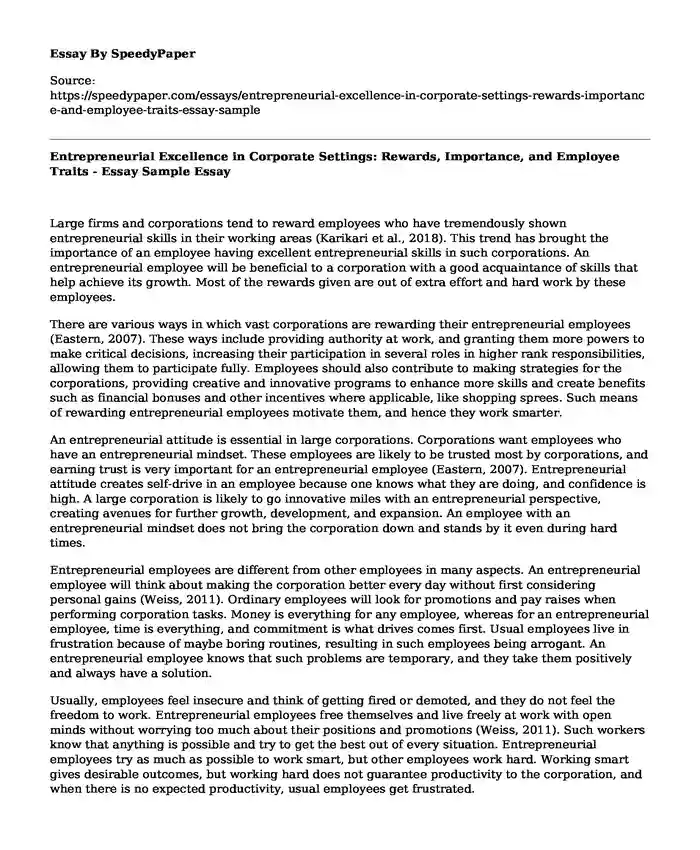
| Type of paper: | Essay |
| Categories: | Knowledge Employment |
| Pages: | 3 |
| Wordcount: | 639 words |
Large firms and corporations tend to reward employees who have tremendously shown entrepreneurial skills in their working areas (Karikari et al., 2018). This trend has brought the importance of an employee having excellent entrepreneurial skills in such corporations. An entrepreneurial employee will be beneficial to a corporation with a good acquaintance of skills that help achieve its growth. Most of the rewards given are out of extra effort and hard work by these employees.
There are various ways in which vast corporations are rewarding their entrepreneurial employees (Eastern, 2007). These ways include providing authority at work, and granting them more powers to make critical decisions, increasing their participation in several roles in higher rank responsibilities, allowing them to participate fully. Employees should also contribute to making strategies for the corporations, providing creative and innovative programs to enhance more skills and create benefits such as financial bonuses and other incentives where applicable, like shopping sprees. Such means of rewarding entrepreneurial employees motivate them, and hence they work smarter.
An entrepreneurial attitude is essential in large corporations. Corporations want employees who have an entrepreneurial mindset. These employees are likely to be trusted most by corporations, and earning trust is very important for an entrepreneurial employee (Eastern, 2007). Entrepreneurial attitude creates self-drive in an employee because one knows what they are doing, and confidence is high. A large corporation is likely to go innovative miles with an entrepreneurial perspective, creating avenues for further growth, development, and expansion. An employee with an entrepreneurial mindset does not bring the corporation down and stands by it even during hard times.
Entrepreneurial employees are different from other employees in many aspects. An entrepreneurial employee will think about making the corporation better every day without first considering personal gains (Weiss, 2011). Ordinary employees will look for promotions and pay raises when performing corporation tasks. Money is everything for any employee, whereas for an entrepreneurial employee, time is everything, and commitment is what drives comes first. Usual employees live in frustration because of maybe boring routines, resulting in such employees being arrogant. An entrepreneurial employee knows that such problems are temporary, and they take them positively and always have a solution.
Usually, employees feel insecure and think of getting fired or demoted, and they do not feel the freedom to work. Entrepreneurial employees free themselves and live freely at work with open minds without worrying too much about their positions and promotions (Weiss, 2011). Such workers know that anything is possible and try to get the best out of every situation. Entrepreneurial employees try as much as possible to work smart, but other employees work hard. Working smart gives desirable outcomes, but working hard does not guarantee productivity to the corporation, and when there is no expected productivity, usual employees get frustrated.
In most large corporations, entrepreneurial employees are getting rewarded from time to time. Rewarding could be in the form of promotions, financial incentives, and salary increases, among others (Lonnie, 2019). These employees deserve such rewards as they put in extra effort to benefit such corporations whenever required. Corporation managers know that when they promote an entrepreneurial employee, the company has someone committed to offering services in the best possible way, and outcomes are positive.
Employees are different according to their mindsets. A corporation rewards the most entrepreneurial and innovative employees majorly. These employees deserve the rewards and have worked smart to warrant such incentives. Entrepreneurial attitude benefits the corporation and the employee when they decide to retire and start their businesses.
References
Eastern, J. S. (2007). Rewarding Employees. Ob.Gyn. News, 42(22), 9. https://doi.org/10.1016/s0029-7437(07)70949-7
Karikari, A. F., Boadi, P. O., & Sai, A. A. (2018). Rewarding employees for corporate performance improvements. Human Systems Management, 37(3), 311–317. https://doi.org/10.3233/hsm-17186
Weiss, D. M. (2011). Entrepreneurial Employees. SSRN Electronic Journal. https://doi.org/10.2139/ssrn.1868646
Lonnie, W. (2019). On Motivation. Sustaining Workforce Engagement, 221–248. https://doi.org/10.4324/9780429442346-15
Cite this page
Entrepreneurial Excellence in Corporate Settings: Rewards, Importance, and Employee Traits - Essay Sample. (2023, Dec 11). Retrieved from https://speedypaper.net/essays/entrepreneurial-excellence-in-corporate-settings-rewards-importance-and-employee-traits-essay-sample
Request Removal
If you are the original author of this essay and no longer wish to have it published on the SpeedyPaper website, please click below to request its removal:
- The Equal Employment Opportunity Commission - Free Essay Sample
- Essay Sample on the Succesful Individual
- Teaching Essay Sample on Classroom Inclusion of Students Who Are Blind and Visually Impaired
- Teaching Essay Sample: Checklist for Assessing the Visual Material Environment
- Essay Sample Dedicated to Evaluating Peer-Reviewed Resources
- Essay Example on Karaoke and Comprehension Skills Among Teens cith Learning Disabilities
- Paper Example. Knowledge Frame Work
Popular categories




